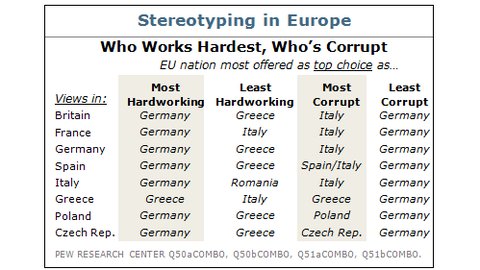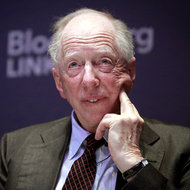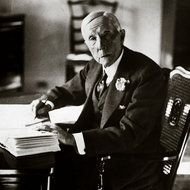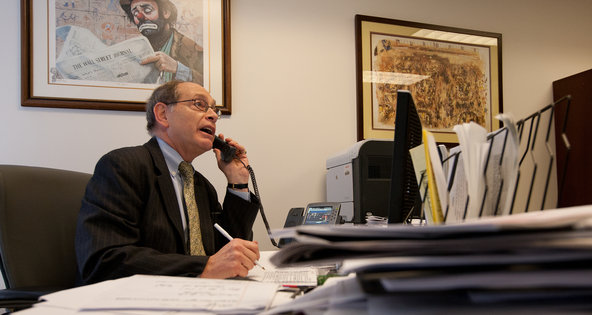FRANKFURT — Josef Ackermann bowed out Thursday as the chief executive of Deutsche Bank after more than a decade in which he transformed the institution into a global contender but also became a symbol to many Germans of the excesses of capitalism.
At the bank’s annual meeting, Mr. Ackermann passed his responsibilities to two subordinates who will run the bank in tandem. Anshu Jain, a native of India who has been in charge of Deutsche Bank’s investment banking operations, will serve as co-chief executive with Jürgen Fitschen, a German whose title is head of Deutsche Bank regional management.
Mr. Ackermann’s talent for drawing both accolades and catcalls was on view during his last appearance before shareholders in an arena often used for rock concerts. Among a crowd of about 7,000 — a record for the company’s meetings — there were some boos and shouted insults as Mr. Ackermann reviewed the bank’s achievements in the last decade. But at the end of his speech shareholders gave him a standing ovation.
Under Mr. Ackermann, the stock has ridden a roller coaster, peaking above 100 euros, or $124, in 2007 but falling below 20 euros in 2009. On Thursday, the shares closed at 29.09 euros.
“I have done my duty and served the company with all my strength,” said Mr. Ackermann, who is retiring, at age 64, having stayed longer than initially planned.
Mr. Ackermann, a Swiss citizen who joined Deutsche Bank from Credit Suisse in 1996 and became chief executive in 2002, made Deutsche Bank a force in international banking while also becoming an influential figure in political circles. Since the financial crisis and subsequent sovereign debt debacle weakened other German banks, Deutsche Bank remains the country’s only institution able to compete with the likes of Goldman Sachs or JPMorgan Chase.
But there were hints Thursday of the succession struggle that marred Mr. Ackermann’s final years at the bank and helped derail plans for him to become chairman of the supervisory board, a part-time oversight role that many of his predecessors have held. During a speech to shareholders, Mr. Ackermann made only the briefest mention of his successors, Mr. Jain and Mr. Fitschen, saying they ‘‘can build on what we have achieved together.’’
The investment banking business run by Mr. Jain, 49, has often been responsible for most of Deutsche Bank’s profit, which last year was 4.3 billion euros. But some critics have questioned putting an investment banker at the head of the institution when risk-taking by traders is under fire, and when Deutsche Bank is trying to re-emphasize traditional businesses like retail banking.
Mr. Fitschen is seen as a transitional figure who will help compensate for Mr. Jain’s lack of fluency in German and maintain the bank’s close ties to political leaders in Europe. At 63, Mr. Fitschen is just a few months younger than Mr. Ackermann.
While Deutsche Bank earned most of its 32 billion euros of revenue last year outside Germany, many Germans regard the bank as de facto common property, although the government has no stake — ‘‘half a bank and half a part of Germany,’’ as the newspaper Handelsblatt wrote recently.
As usual, the annual meeting was a mass event with thousands of shareholders converging on a Frankfurt arena that in a few weeks will be used for a concert by the American rappers Jay-Z and Kanye West. The shareholders lined up for wurst and potato salad at buffet tables, and there was even a place where they could have souvenir photos taken.
Leaders including the German chancellor, Angela Merkel, or Jean-Claude Trichet, president of the European Central Bank until last year, sought Mr. Ackermann’s views, particularly after the financial crisis exploded in 2008. He was also an advocate for banking interests as president of the Institute of International Finance, an industry group whose membership also includes most large U.S. banks.
But Mr. Ackermann has drawn his share of controversy. His salary of 6.3 million euros in 2011 was not outlandish compared with those of the leaders of other big banks. But in some years he has been the highest-paid chief executive in Germany, becoming to some a symbol of corporate greed.
Deutsche Bank has also come under fire for what some critics regard as an unusually high number of lawsuits by aggrieved customers or official investigations. In early May, Deutsche Bank agreed to pay the U.S. government more than $200 million to settle accusations that it knowingly misled the Department of Housing and Urban Development about the quality of mortgages that later defaulted.
“We are concerned about the number of litigations and investigations which have mounted in the last few years,” said Hans-Christoph Hirt, global head of corporate engagement at Hermes Equity Ownership Services, a unit of Hermes Fund Managers that represents several large Deutsche Bank shareholders.
“This doesn’t look good and raises concerns about how new business opportunities and business activities are assessed before they are entered into,” Mr. Hirt said.
Mr. Ackermann acknowledged that the bank had made mistakes. “No business can be worth risking the bank’s reputation and credibility,” he said. “From today’s perspective, and I underline today’s perspective, we did not always completely live up to this principle during the years of excessive exuberance prior to the financial crisis.”
Mr. Hirt also criticized what he said was weak oversight by the bank’s supervisory board, which he blamed for an unseemly public battle over who would succeed Mr. Ackermann.
Clemens Börsig, who ceded his seat as chairman of the supervisory board Thursday, resigned amid criticism of the way he handled the selection of Mr. Ackermann’s successor. And he had warred openly with Mr. Ackermann.
But the two men shook hands warmly on stage at the annual meeting. ‘‘Contrary to press reports, we always worked together in a collegial spirit in the interests of the bank,’’ Mr. Ackermann said.
The relationship between Mr. Ackermann and Mr. Jain, his onetime protégé, also seemed to cool in recent years. During his speech to shareholders, Mr. Ackermann lavished praise on two top executives, Hugo Bänziger and Hermann-Josef Lamberti, who are leaving to make way for managers close to Mr. Jain.
Mr. Börsiis also leaving as chairman of the supervisory board and will be replaced by Paul Achleitner, former head of Goldman Sachs in Germany and until this week chief financial officer of Allianz, a Munich insurance company.
While there is a tradition among Deutsche Bank chief executives of taking over the supervisory board after they retire, some investors objected to Mr. Ackermann’s assuming that role, fearing he might impede his successor. So Mr. Ackermann chose not to seek the post, rather than face possible opposition in the annual meeting.
Mr. Achleitner, who at 55 is young to head the supervisory board of a large German company, is expected to be an activist chairman. That could create friction with Mr. Jain. But Mr. Hirt of Hermes said he welcomed Mr. Achleitner’s influence.
The supervisory board, Mr. Hirt said, should “think a little about the culture and think about the reasons for all the litigation and investigations. That’s really an area we would like them to focus on.”
Article source: http://dealbook.nytimes.com/2012/05/31/ackermann-hands-over-reins-of-deutsche-bank/?partner=rss&emc=rss







